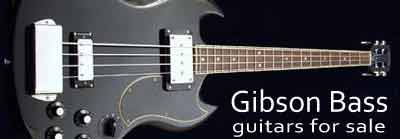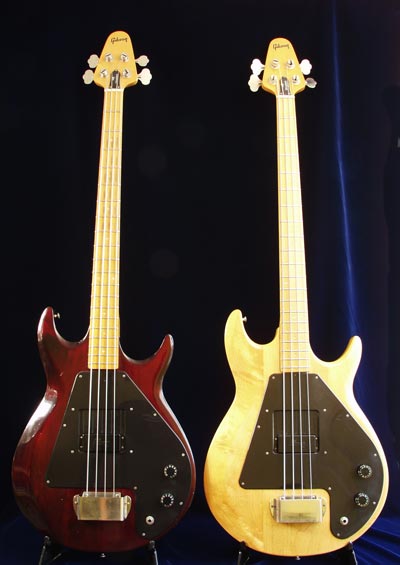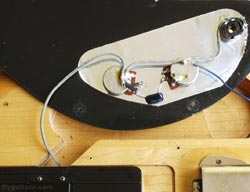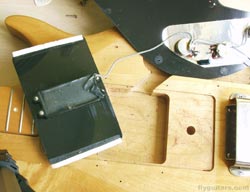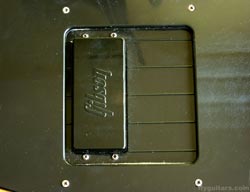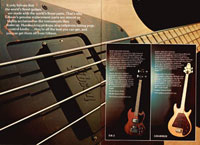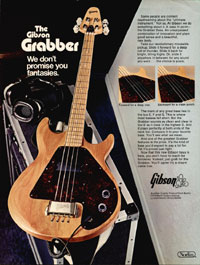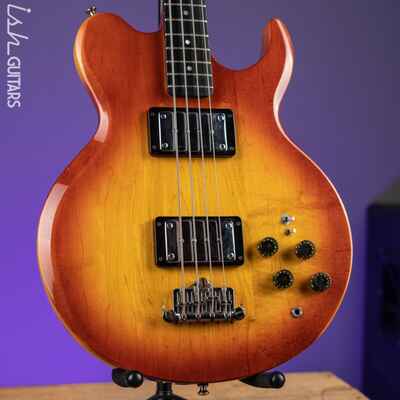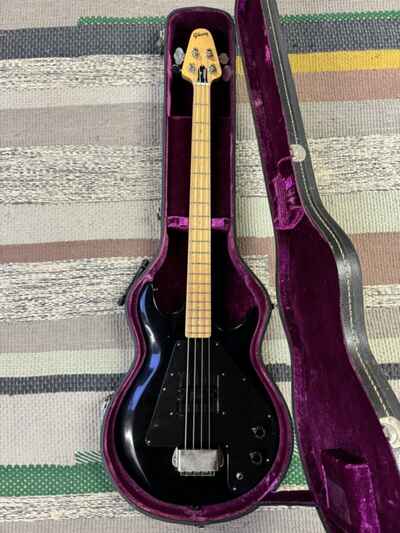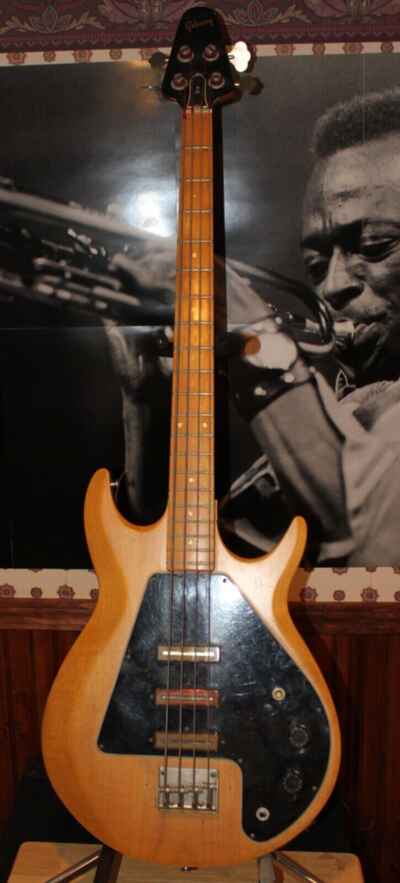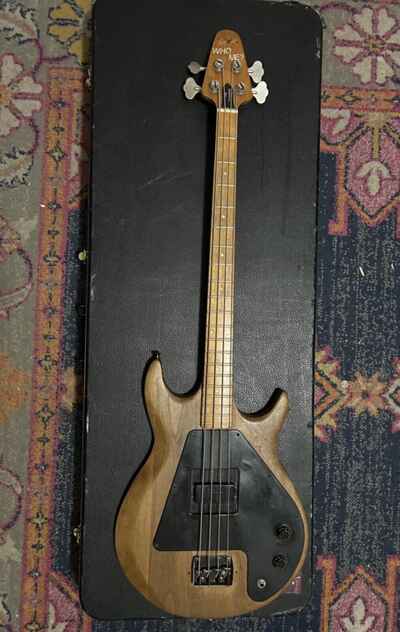• Solid maple or alder body • maple neck • maple fretboard • 34 1/2 inch scale
The Gibson Grabber bass, sometimes known as the G1, was a real departure for Gibson in the early 1970s. Along with its sister instruments the G-3 and the Ripper, it brought some new ideas to the Gibson stable, and in the second half of the 1970s these models became Gibson's best selling basses. The bass itself was designed by Bruce Bolen and Edward Klein. Between the years 1973 and 1979, some 6800 Gibson Grabber bass guitars shipped from the Kalamazoo plant, in Michigan, USA (see shipping stats). The final price list inclusion for this model was in January 1980. Shipping figures beyond this point are not available, but small numbers of Grabber basses were completed in 1982 and 1984. It is highly unlikely the total number shipped exceeded 7000 instruments. See original Gibson Grabber pricing details here.
The early to mid 1970s were tough times for Gibson. Norlin had rescued Gibson in December 1969, and the struggling company really had to make some big changes in order to survive. America was in recession in 1970, and again in 1973-75; Japanese guitar imports had vastly improved in quality, and were directly copying Gibson's own products, often down to the smallest detail. And on top of this, the public seemed to prefer Fender basses. All of this had to be taken into account with the design of the next Gibson bass. Grabber basses had to be easy to produce, highly functional and with a price point in line the Fender Precision.
Gibson Grabber bass construction
As well as a new body shape and Flying V headstock shape, the Grabber was the first bolt-on neck Gibson bass. The model got it's name from the innovative 'sliding pickup' which allowed manual positioning (see images below); you literally 'grab' the pickup, and slide it where you want it. Towards the bridge for maximum treble response, and towards the neck for maximum bass. This was not a completely new idea; basses by Alembic and Dan Armstrong had previously fitted pickups on rails to produce a similar effect. The bolt on maple neck was more in Fender's tradition of building guitars, and this construction has a big impact tonally; the Grabber has a much brighter, more Fender-like tone than most Gibson basses.
Find more information on the Grabber circuitry here.
It was, of course, built to be an affordable bass, because it had to compete commercially, not only with the classic Fender models, but also the huge numbers of high quality imported instruments increasingly taking market share from American manufacturers. The Grabber used less expensive parts, the least parts and cheapest construction methods possible. The sliding pickup gave the sounds of a bridge or neck position, with just one pickup, 2 pots and no switches, all mounted on the scratchplate. The Fender-like bridge was far simpler than the usual Gibson post-mounted versions, and the front-routed body with bolt-on neck is still the simplest, and quickest way to manufacture and assemble a guitar. The lightweight bridge was not designed as a tailpiece, however, and necessitated extra long scale strings, strung through the guitar's body, entering from the reverse.
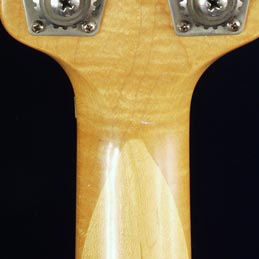
The Gibson Grabber bass scarfed neck joint, as seen on the majority of Grabber basses.
An interesting feature of the Gibson Grabber bass (and the G3) was the scarfed neck joint. This was a means of producing a headstock separately from the neck, and joining the two, primarily as a cost-cutting endeavour. It allowed the bass to have a greater headstock angle whilst using much less wood. This was a commonplace construction technique used by many guitar manufacturers, but not (certainly in recent times, and never previously on a bass) by Gibson. It is probable that this was influenced by Bill Lawrence who was with Gibson at this time, and who had previously designed with Framus - a company who had used this technique with regularity over many decades.
From late 1982, Gibson started using three piece maple necks for the Grabber and G3, with the same typical lengthways laminate construction that they used more generally. These necks are quite distinctive though, typically being made with very highly figured maple, but no volute.

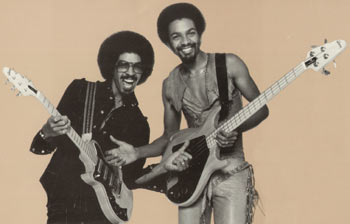
The Gibson Grabber bass sale price was $319 for the Natural Satin finish (alder body), or $369 for Wine red finish In January 1975. This was not only Gibson's cheapest bass (the Ripper is $449, EB3 $499, and the Les Paul Signature and Triumph are $629 and $679 respectively), but the cheapest guitar in this catalogue period. The Marauder was the cheapest six string at $349; the reason behind this may have been to directly target Fenders Precision and Telecaster basses, which were then priced $325 and $330 respectively.
The most famous users were probably Gene Simmons from the band Kiss, Suzi Quatro (Suzi tells us what she thinks of this bass in our Suzi Quatro mini interview) and Louis Johnson of the Brothers Johnson.
The model first appeared in the 1975 catalog, described as follows
The Grabber's sliding pickup offers a wide variety of sounds. Slide it forward for a deep rhythm roar, backward for a full treble punch, or slide it anywhere in between
Sales were strong, and almost immediately the Grabber replaced the SB series and EBO as Gibson's entry level bass. For more details of catalogue appearances, see prices & publicity.
Gibson Grabber rarities
The Grabber was all about creating a great bass, but at a significantly more competitive price than other Gibson basses - in line with the competition from Fender. The very earliest examples of the Gibson Grabber bass had quite different necks from the scarfed-jointed examples that represent the vast majority of G1 and G3 production. It was one piece, with a skunk-stripe on the back, and it did not have the back-slanting headstock angle that typifies all Gibson basses. At least one of Gene Simmons' Grabbers has this feature, as does (most likely, certainly the headstock angle) the early 1975 advert for the Gibson Grabber. The original design patent (239052) filed in late 1974 also clearly shows this lack of headstock angle. (Actually Gibson had been experimenting with reduced headstock angles on basses previously in 1971- notably the SB300 and SB400).
The shipping figures do split by finish. The most abundant finishes were Natural, and Ebony. The rare colours were White (58 examples in 1976-77), Walnut (76 examples between 1977-79). There are no shipping statistics for later examples in Candy Apple Red and Metallic Blue, but these will probably have been produced in tens rather than hundreds.
Gibson Grabber bass chronology
1973-74 Model introduction - maple body, only wine red or ebony finishes available. However only 1 instrument shipped in 1973, and 219 in 1974 - see the Grabber shipping totals). However a Gibson letter to dealers from late 1975 remarks on "the successful introduction of the Grabber Bass in January of 1975".
1975 The G1 was well received at the 1975 NAMM trade show alongside the G-3. Peak year for Grabber production, 2637 instruments shipped. Natural Satin finish also now available, these guitars having an alder body and maple neck.
1976 White finish introduced.
1977 Walnut and Maple Gloss finishes introduced. Maple Gloss is simply clearcoat over a maple body. Grabbers were available in maple and alder.
1982 Candy Apple Red and Metallic Blue finishes available.
1984 Model discontinued, final Grabber shipped.
Gibson Grabber sound clips
These sound clips are recorded directly into a mobilepre preamp. Recorded with flat wound strings.
Volume and tone control on 10, played finger style
Pickup towards the bridge, volume and tone control on 10, played finger style
Pickup towards the bridge, volume and tone control on 10, played with a pick
Gibson Grabber reissue
Gibson reissued the Grabber (as the Gibson Grabber 2, or Grabber II), with a few minor changes - a three point bridge replacing the old version, and a new T-bird+ humbucker. 350 examples were produced in 2009.
An Epiphone Grabber was also produced in small numbers with a simple fixed pickup.
Gibson Grabber bass for sale
1972 Gibson L6-S Bass Prototype (Ripper, Grabber) Singlecut Sunburst
Syracuse, New York, 132**, UNITED STATES OF AMERICA
$9000
This bass guitar is the prototype for the L6-S bass, a model that was never manufactured by Gibson. Although it is the prototype for an instrument that was not produced, it also seems to be a prototype of the Ripper and Grabber models introduced later that are constructed with the same materials (maple neck and body) and similar dimensions. The look of this one does foreshadow those later models
SETUP & ... more
1978 Gibson Grabber Bass Natural
Salt Lake City, Utah, 841**, UNITED STATES OF AMERICA
$2899
Includes Original Hard-Shell Case
Up for sale is a 1978 Gibson Grabber Bass in its classic Natural finish, complete with its original hard-shell case. This vintage gem is in very good condition and plays flawlessly
Condition & Features
Overall Condition: 8 5 / 10 ?? Some scratches, dings, and wear on the back, adding character to this 46-year-old bass Originality: 100% original with no modifications Neck: Straight and stable, ... more
CLEAN! Vintage Gibson Grabber Bass!! Plays great! W / alt Pickguard
Monticello, New York, 127**, UNITED STATES OF AMERICA
$3000
The bass plays great and has been well-maintained, ensuring its quality and reliability. Whether you're a seasoned player or a ... more
Vintage 1976 Gibson G3 Grabber Electric Bass with original hard Gibson Case
East Amherst, New York, 140**, UNITED STATES OF AMERICA
$3200
Vintage Gibson Grabber Bass 1974-1975
Allston, Massachusetts, 021**, UNITED STATES OF AMERICA
$2200
... more
1974 GIBSON GRABBER / RIPPER BASS CASE - made in USA
COLOGNE, GERMANY
€333
+ black tolex, has a lot of wear & rips
+ rips & material missing at the plastic surround
+ strap that holds case open has a rip
+ deep purple interior, has some wear
+ all latches work fine
+ handle is gone
+ top of case is at headstock front resting on the bottom part=NOT OVRRLAPPING AS USUAL
+ all feet on back are missing
Over 1000 more
GUITARS-BASSES-PARTS in our OTHER
AUCTIONS !!!!
TAKE A LOOK ... more
1974 GIBSON GRABBER / RIPPER BASS CASE - made in USA
COLOGNE, GERMANY
€279
1974 GIBSON GRABBER / RIPPER BASS CASE - made in USA:
+ black tolex, has a lot of wear & rips
+ bottom is loose=check pic 7
+ strap that holds case open is gone
+ deep purple interior, has stains
+ 1 latch is broken=check last pic
+ handle was replaced
+ all feet on bottom are missing
Over 1000 more
GUITARS-BASSES-PARTS in our OTHER
AUCTIONS !!!!
TAKE A LOOK !!!... more
Gibson Grabber Bass Guitar
Hallam, VIC, 3***, AUSTRALIA
AU $4500
Looking for a new owner as I don??t play much anymore
A fantastic vintage bass
Can see bass in Hallam Victoria, will not post
... more
Hi, my bass player has a gibson grabber bass in wine red with maple fretboard and natural headstock, with the single sliding pickup and 2 control knobs, but we cant figure out the date. It has a serial number of 927014. It was suggested could be an early production 1972. Is it possible there were any earlier grabbers made prior to 1973 in wine red? Since the grabbers were manufactured from 73-83 only. Any help is much appredciated. It also has old original case. Thanks
I have a maple grabber #00184153, what year is it and how much is it worth about? Sill plays great. Thanks
A 70s serial number starting 00 will indicate a 1976 bass. The number is a decal, right? This was a short lived scheme, being replaced by a stamped eight digit serial number from 1977.


